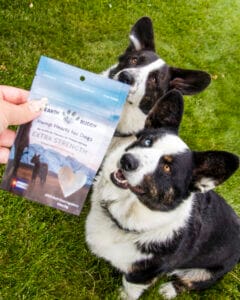How Many Hours Do Dogs Sleep a Day?
August 17, 2023
Written By: Earth Buddy Team

Many dog owners find themselves wondering, how many hours do dogs sleep? Observing your dog throughout the day, you may notice that they seem to nap quite a bit more than their human counterparts. Learning how many hours dogs typically sleep in a day and the factors that influence their sleep patterns can help you understand what’s normal and what may not be.
Understanding Your Dog’s Sleep Cycle
Dogs sleep more than humans, but their sleep cycles are shorter. Unlike humans, who have a longer REM (Rapid Eye Movement) sleep cycle where dreaming occurs, dogs enter REM sleep more frequently but for shorter durations. This is why you might notice your dog twitching, growling, or moving their paws as if running in their sleep; they are in their dream stage!
Dogs also have a different sleep cycle compared to humans, often sleeping more but for shorter periods. The exact amount of sleep a dog needs can vary based on factors like age, breed, and activity level. Puppies sleep more than the average adult dog, aside from senior dogs that may need as much sleep as pups do.
Your Dog’s Sleep Stages
A dog’s sleep cycle consists of two main stages: slow-wave sleep (SWS) and rapid eye movement (REM) sleep. In the SWS stage, the dog is in a light sleep and can be easily awakened. In the REM stage, the dog is in a deeper sleep and may dream, as evidenced by twitching, moving, or even barking.
However, dogs spend less time in this deep REM sleep than humans do, which is one reason why they may need more total hours of sleep. Dogs also have a flexible sleep schedule and can adjust their sleep patterns to be awake when necessary, such as for meals or walks, and sleep when there’s less activity.
How Many Hours Do Dogs Sleep?
A dog’s sleep schedule varies on a case-by-case basis. Some dogs may sleep more than others simply because every dog is different from the other, but there are a variety of factors that could affect their sleep patterns. These factors include:
Puppies and Senior Dogs Tend to Sleep More
One of the most significant factors influencing a dog’s sleep is their age. Puppies, with their boundless energy, spend more time in active growth and play, requiring up to 20 hours of sleep per day to support their rapid development. Adult dogs typically need less sleep, averaging between 12 and 14 hours, while senior dogs may sleep more than adults due to decreased energy levels and to support their overall health.
Breed and Size Affect How Many Hours Dogs Sleep
Breed and size significantly influence a dog’s sleep pattern, often in ways that may seem counterintuitive. Large breed dogs such as Saint Bernards, Mastiffs, or Newfoundlands (along with other breeds that are on the large side) are known to sleep more, often requiring up to 14 hours of sleep per day or even more. This is primarily because larger dogs typically expend more energy in daily activities, thus requiring longer rest periods for proper recuperation.
On the other hand, smaller, more energetic breeds like the Jack Russell Terrier or Border Collie may sleep less despite their high activity levels, often due to their smaller size requiring less energy expenditure.
Specific breeds also have unique traits and genetic predispositions that can impact sleep duration and quality. For instance, breeds like the Bulldog or Pug, characterized by brachycephalic (short-nosed) traits, may experience disrupted sleep due to breathing difficulties. In general, a dog’s breed and size can provide a guideline, but individual variations will also play a role.
Health and Well-Being
A dog’s health status significantly affects their sleeping habits. Dogs with medical conditions may sleep more than others, which could explain why dogs sleep so much when they aren’t feeling well. They’re like humans in that regard. Behavioral issues like separation anxiety can also disrupt a dog’s sleep.
If your dog seems to be having trouble sleeping, offering a supplement like CBN for dogs may:
- Promote restful sleep
- Have a calming effect on nerves
- Provide help coping with external stresses
- Help manage normal stress
- Promote relaxation
Activity Level During Awake Hours
A dog’s activity level plays a crucial role in determining the amount of sleep they need. Similar to humans, physical exertion requires recovery time, and for dogs, this often means more deep sleep. Active dogs that engage in regular exercise, training, or work (such as herding or service dogs) typically require more sleep to replenish their energy levels and promote muscle repair and growth.
Conversely, dogs that are less active or lead a more sedentary lifestyle may sleep less, although they still require sufficient rest for overall health. However, prolonged inactivity combined with excessive sleep could potentially indicate health issues or boredom. Therefore, it’s crucial to strike a balance between ensuring your dog has enough physical activity for their breed, size, and age and allowing them ample time to rest and rejuvenate.
Diet Can Affect Dogs Sleep Patterns
The diet of a dog greatly impacts their sleep patterns, as food serves as the source of energy that fuels their activities. High-quality, balanced diets provide the nutrients dogs need to be active and healthy, which in turn supports regular sleep patterns. Diets rich in essential proteins, fats, and complex carbohydrates can help sustain their energy levels, leading to a balance of activity and rest.
A diet lacking in necessary nutrients can lead to decreased energy and lethargy, potentially resulting in more sleep. Foods high in sugar or simple carbohydrates, while providing a quick energy burst, can also lead to energy crashes that disrupt regular sleep patterns and affect how many hours a day they sleep.
Pet owners should avoid overfeeding, only providing the portion necessary to keep their dogs satisfied. Overfeeding may cause sleep disruptions and other health problems. Therefore, it’s essential to feed your dog a balanced diet appropriate for their breed, size, age, and activity level, and always provide fresh water to aid digestion and hydration.
Environment Affects How Your Dog Sleeps
A dog’s environment significantly influences their sleep patterns and overall quality of sleep. Just like humans, dogs need a quiet, comfortable, and secure place to sleep. Noise disruptions, bright lights, or high foot traffic areas can lead to fragmented sleep. The temperature of the environment also matters; dogs can struggle to sleep if it’s too hot or too cold. Providing your dog with a comfortable bed in a quiet and temperature-controlled area can help ensure they get the rest they need.
The sleeping area should also be safe. For instance, puppies or older dogs with mobility issues should have easy, safe access to their comfortable dog bed. If possible, keeping the sleeping area consistent can also help, as dogs are creatures of habit, and changes in their environment can cause confusion. Cleanliness is also important; regular cleaning of your dog’s sleeping area can help prevent potential health issues and further promote a peaceful sleep environment.
Dogs Need a Routine for Good Sleeping Habits
A consistent daily routine plays a pivotal role in influencing a dog’s sleep pattern. Dogs are creatures of habit and thrive on structure and predictability. Regular timings for meals, walks, playtime, and sleep help set your dog’s internal “clock,” scientifically known as the circadian rhythm, and can aid in establishing healthy sleep patterns. When your dog’s routine is stable, most dogs tend to sleep while their human family is away or asleep themselves, aligning their schedule with that of their human companions.
Disruptions to this routine can impact your dog’s comfort levels potentially resulting in sleep disturbances. For instance, changing the time when you feed your dog or when you return home from work can unsettle your pet and impact their sleep. Therefore, maintaining a consistent daily routine, as much as possible, can significantly improve your dog’s quality of sleep, overall well-being, and behavior.
When to Be Concerned About Your Dog’s Sleep
While it’s normal for most dogs to sleep much of the day, significant changes in your dog’s sleep patterns can be cause for concern. If your dog is sleeping excessively or seems unusually lethargic, it may be time to consult your vet. Your dog getting enough sleep is also important in supporting the immune system. Sleep deprivation is a serious issue that shouldn’t be overlooked. Take note of hour many hours a day your dog sleeps, how long it takes them to fall asleep, and your dog’s sleeping habits.
For further reading, we recommend:
You Might Also Enjoy
Reactive dog barking may sound intimidating, but it’s important to differentiate it from dog aggression.…
Your dog’s skin is their largest organ making dog skin care a crucial part of…
Like us, our dogs, and other mammalian species, cats have an endocannabinoid system. This system…






